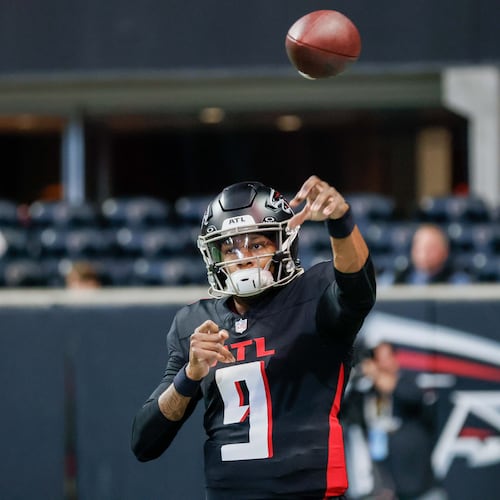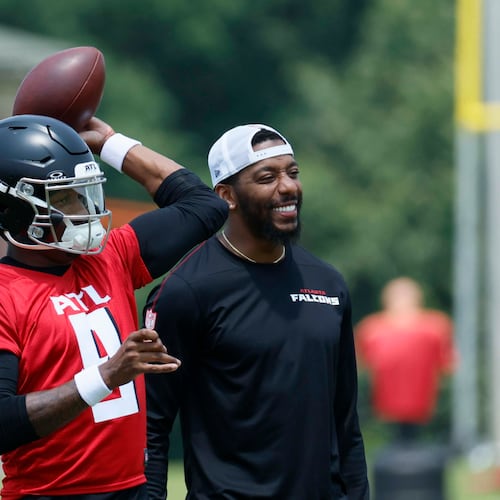In a final move which ends their salary-cap grievance with former quarterback Michael Vick, the Falcons recently received $3 million in salary-cap credits from the league.
The relief came from signing bonus money Vick owed the Falcons after he declared bankruptcy in wake of going to prison on federal dogfighting charges in 2007.
After cornerback Asante Samuel was signed by the Falcons on Wednesday, the team had just over $1 million of salary-cap space. On Monday, the team had $4,068,441 million in salary-cap room for 2012, reflecting the increase from the Vick credit.
The Falcons were Vick’s biggest creditor in bankruptcy. They were owed $7.5 million from his signing bonus after he defaulted on his 2005 contract, a 10-year, $130 million deal.
In April 2009, Vick and the Falcons reached a settlement on the salary-cap refund. The Falcons have sought salary-cap credits from the league since August 2011, when Vick signed a six-year, $100 million contract with the Philadelphia Eagles.
At that time, Greg Aiello, the NFL’s vice president of public relations, noted that salary-cap credits are decided on a case-by-case basis and acknowledged that the Falcons’ case was under review. The league referred all comments to the team, which declined to comment.
The Falcons have been juggling their salary-cap situation this offseason.
They focused on re-signing their own players and struck deals with defensive end John Abraham, safety Thomas DeCoud, wide receiver Harry Douglas, defensive end Kroy Biermann, center Todd McClure and quarterback Chris Redman. They also signed linebacker Lofa Tatupu and guard Vince Manuwai as free agents.
The team also placed the franchise tag on cornerback Brent Grimes, who’s set to make $10.281 million after signing his tender.
Also, the team did not re-sign middle linebacker Curtis Lofton, who signed a modest five-year, $27.5 million deal with the New Orleans Saints. He was a four-year starter and team’s leading tackler in each of the past three seasons.
The issue of the tight salary cap may have led the Falcons to select fullback Bradie Ewing in the fifth round of the NFL draft. Fullback Ovie Mughelli’s $3.7 million cap number might be too high for the team to carry in 2012.
Falcons general manager Thomas Dimitroff did not want to address Mughelli’s status or the team’s financial situation after the draft Saturday.
“I don’t want to comment on financial situations and our cap situation publicly,” Dimitroff said. “That’s what we discuss back in our offices. Suffice it to say, we feel like this opens up competition at the position. We have three solid fullbacks here that we hope will compete very strongly for the job. Really, we don’t have any plans right now to do much of anything else, but step back and look at our roster and see who is going to fit in where.”
To make all of their offseason moves, the Falcons have been scrambling as they’ve restructured the contracts of cornerback Dunta Robinson and left guard Justin Blalock.
In order to free up some salary-cap space to fit in Samuel’s three-year, $18.5 million contract under the cap, the Falcons restructured Blalock’s contract.
Blalock was a free agent last season and signed a six-year, $38 million contract. Before the restructure, Blalock’s cap number was $5.3 million for 2012. It is now $3.86 million, a cap savings of $1.44 million.
Earlier this offseason, the Falcons restructured Robinson’s contract, to provide the team with an additional $1.55 million in salary-cap space in 2012.
On Jan. 25, Robinson’s cap number for 2012 was $7.55 million. His current cap number for next season is $6 million.
Robinson passed on a $3 million option bonus in favor of having $5 million in base salary guaranteed this year and another $3 million guaranteed next year.
The Falcons could use the space to fit in their rookie class. Over the past four years under Dimitroff, the team has reserved enough salary-cap space to pursue veteran salary-cap casualties near the end of training camp.
About the Author
Keep Reading
The Latest
Featured



